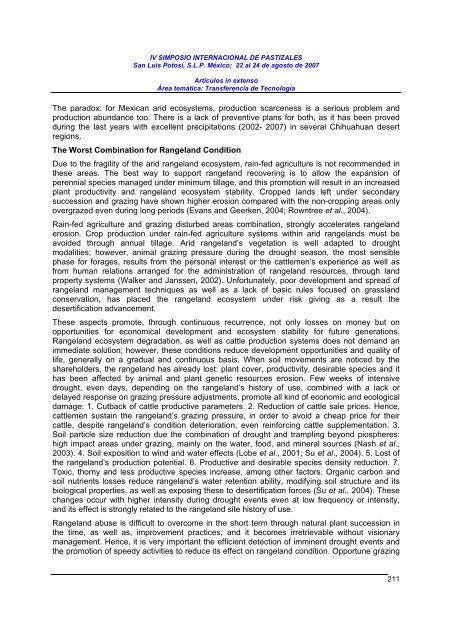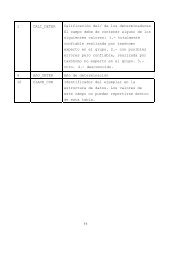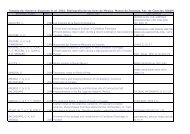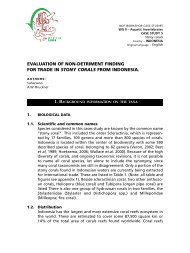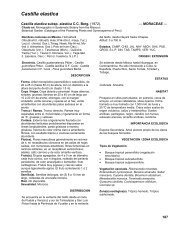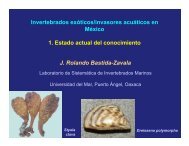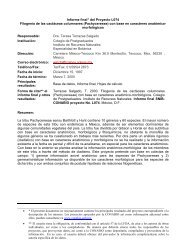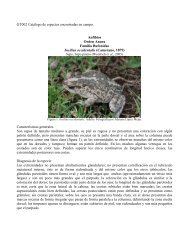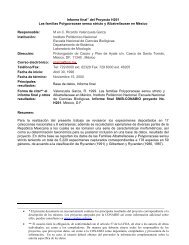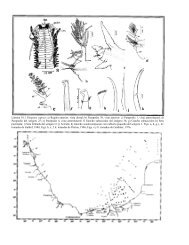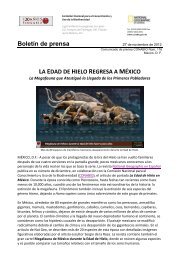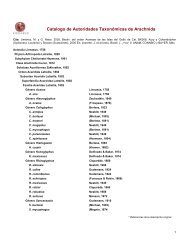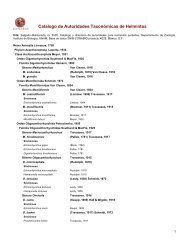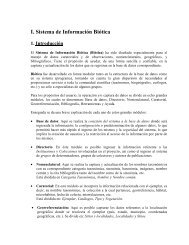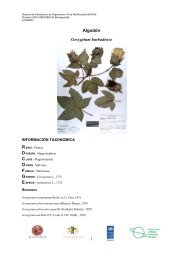ecosystem services to and from north american arid ... - Conabio
ecosystem services to and from north american arid ... - Conabio
ecosystem services to and from north american arid ... - Conabio
Create successful ePaper yourself
Turn your PDF publications into a flip-book with our unique Google optimized e-Paper software.
IV SIMPOSIO INTERNACIONAL DE PASTIZALES<br />
San Luis Po<strong>to</strong>sí, S.L.P. México; 22 al 24 de agos<strong>to</strong> de 2007<br />
Artículos in extenso<br />
Área temática: Transferencia de Tecnología<br />
The paradox: for Mexican <strong>arid</strong> <strong>ecosystem</strong>s, production scarceness is a serious problem <strong>and</strong><br />
production abundance <strong>to</strong>o. There is a lack of preventive plans for both, as it has been proved<br />
during the last years with excellent precipitations (2002- 2007) in several Chihuahuan desert<br />
regions.<br />
The Worst Combination for Rangel<strong>and</strong> Condition<br />
Due <strong>to</strong> the fragility of the <strong>arid</strong> rangel<strong>and</strong> <strong>ecosystem</strong>, rain-fed agriculture is not recommended in<br />
these areas. The best way <strong>to</strong> support rangel<strong>and</strong> recovering is <strong>to</strong> allow the expansion of<br />
perennial species managed under minimum tillage, <strong>and</strong> this promotion will result in an increased<br />
plant productivity <strong>and</strong> rangel<strong>and</strong> <strong>ecosystem</strong> stability. Cropped l<strong>and</strong>s left under secondary<br />
succession <strong>and</strong> grazing have shown higher erosion compared with the non-cropping areas only<br />
overgrazed even during long periods (Evans <strong>and</strong> Geerken, 2004; Rowntree et al., 2004).<br />
Rain-fed agriculture <strong>and</strong> grazing disturbed areas combination, strongly accelerates rangel<strong>and</strong><br />
erosion. Crop production under rain-fed agriculture systems within <strong>arid</strong> rangel<strong>and</strong>s must be<br />
avoided through annual tillage. Arid rangel<strong>and</strong>’s vegetation is well adapted <strong>to</strong> drought<br />
modalities; however, animal grazing pressure during the drought season, the most sensible<br />
phase for forages, results <strong>from</strong> the personal interest or the cattlemen’s experience as well as<br />
<strong>from</strong> human relations arranged for the administration of rangel<strong>and</strong> resources, through l<strong>and</strong><br />
property systems (Walker <strong>and</strong> Janssen, 2002). Unfortunately, poor development <strong>and</strong> spread of<br />
rangel<strong>and</strong> management techniques as well as a lack of basic rules focused on grassl<strong>and</strong><br />
conservation, has placed the rangel<strong>and</strong> <strong>ecosystem</strong> under risk giving as a result the<br />
desertification advancement.<br />
These aspects promote, through continuous recurrence, not only losses on money but on<br />
opportunities for economical development <strong>and</strong> <strong>ecosystem</strong> stability for future generations.<br />
Rangel<strong>and</strong> <strong>ecosystem</strong> degradation, as well as cattle production systems does not dem<strong>and</strong> an<br />
immediate solution; however, these conditions reduce development opportunities <strong>and</strong> quality of<br />
life, generally on a gradual <strong>and</strong> continuous basis. When soil movements are noticed by the<br />
shareholders, the rangel<strong>and</strong> has already lost: plant cover, productivity, desirable species <strong>and</strong> it<br />
has been affected by animal <strong>and</strong> plant genetic resources erosion. Few weeks of intensive<br />
drought, even days, depending on the rangel<strong>and</strong>’s his<strong>to</strong>ry of use, combined with a lack or<br />
delayed response on grazing pressure adjustments, promote all kind of economic <strong>and</strong> ecological<br />
damage: 1. Cutback of cattle productive parameters. 2. Reduction of cattle sale prices. Hence,<br />
cattlemen sustain the rangel<strong>and</strong>’s grazing pressure, in order <strong>to</strong> avoid a cheap price for their<br />
cattle, despite rangel<strong>and</strong>’s condition deterioration, even reinforcing cattle supplementation. 3.<br />
Soil particle size reduction due the combination of drought <strong>and</strong> trampling beyond piospheres:<br />
high impact areas under grazing, mainly on the water, food, <strong>and</strong> mineral sources (Nash et al.,<br />
2003). 4. Soil exposition <strong>to</strong> wind <strong>and</strong> water effects (Lobe et al., 2001; Su et al., 2004). 5. Lost of<br />
the rangel<strong>and</strong>’s production potential. 6. Productive <strong>and</strong> desirable species density reduction. 7.<br />
Toxic, thorny <strong>and</strong> less productive species increase, among other fac<strong>to</strong>rs. Organic carbon <strong>and</strong><br />
soil nutrients losses reduce rangel<strong>and</strong>’s water retention ability, modifying soil structure <strong>and</strong> its<br />
biological properties, as well as exposing these <strong>to</strong> desertification forces (Su et al., 2004). These<br />
changes occur with higher intensity during drought events even at low frequency or intensity,<br />
<strong>and</strong> its effect is strongly related <strong>to</strong> the rangel<strong>and</strong> site his<strong>to</strong>ry of use.<br />
Rangel<strong>and</strong> abuse is difficult <strong>to</strong> overcome in the short term through natural plant succession in<br />
the time, as well as, improvement practices; <strong>and</strong> it becomes irretrievable without visionary<br />
management. Hence, it is very important the efficient detection of imminent drought events <strong>and</strong><br />
the promotion of speedy activities <strong>to</strong> reduce its effect on rangel<strong>and</strong> condition. Opportune grazing<br />
211


